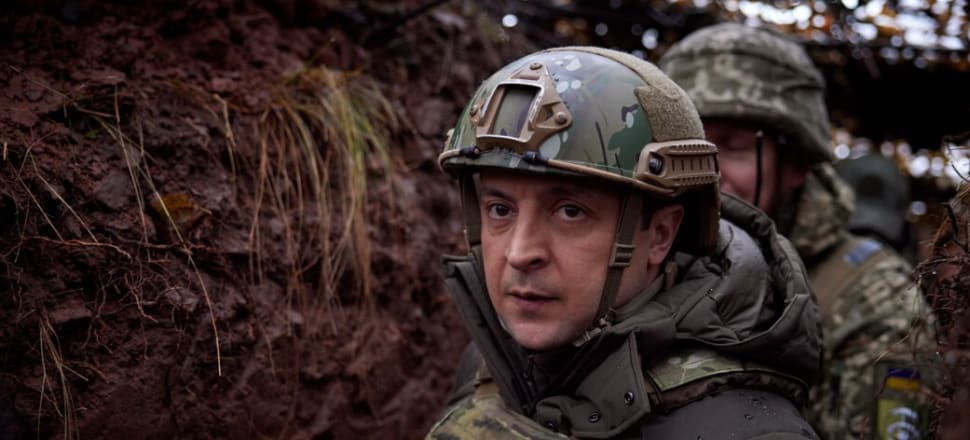
New Zealand opposes Putin’s Ukraine invasion, but is it doing enough to help Ukraine restore its territory and sovereignty? Robert Patman takes stock of the past year.
The one-year anniversary of the Putin regime’s full-scale invasion of Ukraine is, in many ways, a fitting moment to consider New Zealand’s response to the greatest use of force in Europe by one state against another since 1945.
According to Ukrainian President Volodymyr Zelensky, Jacinda Ardern’s Labour Government was one of the first countries to publicly support Ukraine after what the then New Zealand Prime Minister called “an unprovoked and unnecessary attack by Russia”.
New Zealand Foreign Minister Nanaia Mahuta condemned “this breach of Ukraine’s territorial integrity and sovereignty” as a major departure from “fundamental international rules”.
In response, New Zealand’s Government swiftly implemented a number of measures, including a travel ban on Russian officials, limiting diplomatic engagements, passing a dedicated Russia Sanctions Bill, and by mid-March 2022 had extended NZ$6 million in humanitarian aid to Ukraine.
READ MORE: * NZ’s nightmare scenario in Ukraine war * Three lessons for New Zealand from the Ukraine war
However, unlike many of its traditional allies, the Ardern Government during the first six weeks of the conflict confined itself to non-military assistance.
This cautious approach was related to several factors.
First, some observers in this country insisted that New Zealand was a small state that was incapable of making a difference in relatively distant places like Ukraine.
Second, and not unrelated, there were diplomats and scholars here and elsewhere claiming a great power like Russia could not lose in Ukraine and New Zealand’s interests were best served contributing to negotiations for some sort of ‘land for peace’ deal that Putin’s regime could accept without feeling humiliated.
But such claims proved to be amoral and inaccurate.
The Putin regime’s attempt to seize Kyiv, Ukraine’s capital city, and oust the Zelensky government was decisively rebuffed by Ukraine’s army.
By late March, the invading Russian force was forced to retreat to the eastern industrial heartland of Donbas, where Russia-backed separatists have fought Ukrainian forces since 2014 following Moscow’s annexation of Crimea.
In the wake of the Russian retreat, strong evidence appeared of war crimes committed by the invading forces.
In particular, in the city of Bucha, evidence emerged of torture, mutilation, rape, systematic looting and the deliberate killings of civilians.
It was in this context that the Ardern Government decided it would have to do more to help Ukraine defend itself against the aggression unleashed by the Putin regime.
By April 10, Ardern announced what she called a “significant” military aid and training programme for Ukraine.
The package involved the deployment of one of the country’s five C-130 transport planes and nearly 70 military and intelligence personnel to Europe – the biggest deployment of New Zealand troops since Bosnia in the mid-1990s.
It also included an additional $13 million of support, with $7.5 million of that being contributed to be spent through the UK on weapons and ammunition for the Ukrainian military.
The toughening of the Ardern Government’s response to the Russian invasion was broadly welcomed in Ukraine and other liberal democracies.
In late June, the New Zealand Prime Minister told a Nato leaders summit “Russia’s actions are an affront to all of us” and said Moscow’s “use of its UN Security Council position to block consideration of the invasion is morally bankrupt” and “demonstrates why we must continue to seek reform of the UN”.
Some commentators in New Zealand interpreted the Ardern Government’s evolving Ukraine policy as an indication the country was abandoning an independent foreign policy in order to fall into line with America strategic priorities.
But this assessment was wide of the mark. The Ardern Government had distinctive reasons, beyond simply following America’s lead, for strongly rejecting Putin’s Ukraine invasion.
Historically, New Zealand has been a firm supporter of a strengthened international rules-based order, enshrined in institutions such as the United Nations and embodied in norms such as multilateralism.
Putin’s invasion of Ukraine confirmed what has been clear for much of the post-Cold War era – the UN Security Council is no longer fit for purpose.
Ukraine’s President Zelensky has pledged to push for a reformed Security Council that can more effectively hold aggression in check and that goal converges with a core New Zealand national interest in strengthening the international rules-based order.
In short, the Ardern Government increasingly recognised it had a big stake in helping Ukraine defeat Putin’s expansionism.
By September, it was clear the stance of the New Zealand Government was hardening. In an address to the UN General Assembly, Ardern described Russia’s invasion as “illegal”, “immoral” and based on a false narrative of liberation.
Moreover, the news that Dominic Abelen, a highly respected Kiwi soldier, and Andrew Bagshaw, a much admired New Zealand humanitarian worker, had lost their lives in Ukraine during the previous six months only served to heighten the sense of outrage here about the Russian invasion.
The visit of then defence minister, Peeni Henare, to Ukraine in November and Zelensky’s address to the Beehive in December coincided with an extension of New Zealand’s UK-based training programme for Ukrainian soldiers and an additional $3 million of humanitarian aid to Ukraine.
The question that now faces Prime Minister Chris Hipkins as Ukraine faces a renewed Russian offensive is whether New Zealand is doing its fair share in an international effort to help Ukraine defend itself?
To date, New Zealand has contributed more than $40 million in humanitarian and military aid to Ukraine
This is costly for the taxpayer, but the costs for New Zealand and other small and middle powers will be much greater still if the Putin authoritarian regime is allowed to succeed in its brutal attempt to annex a democratic neighbour.







